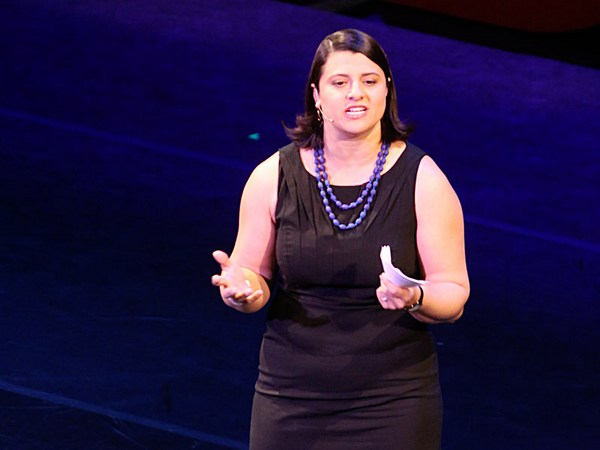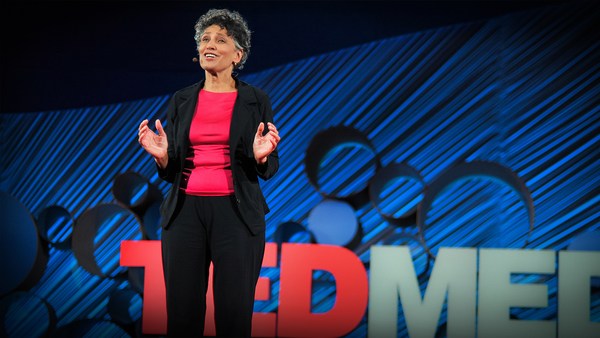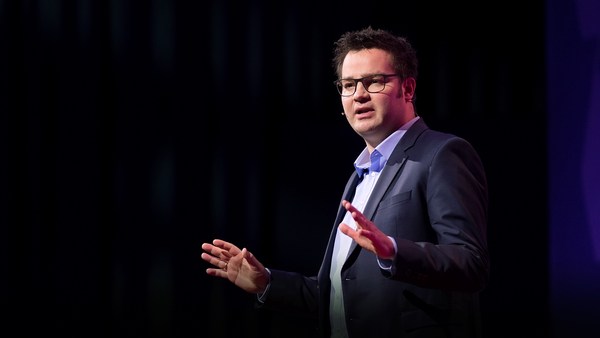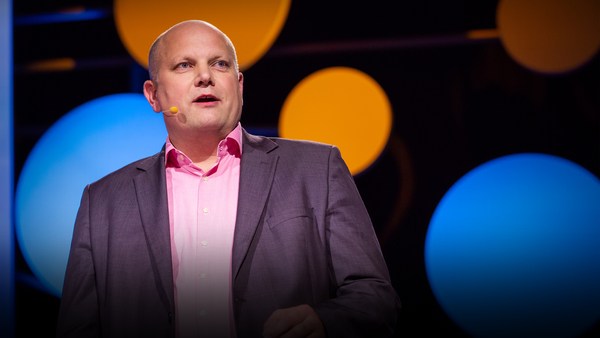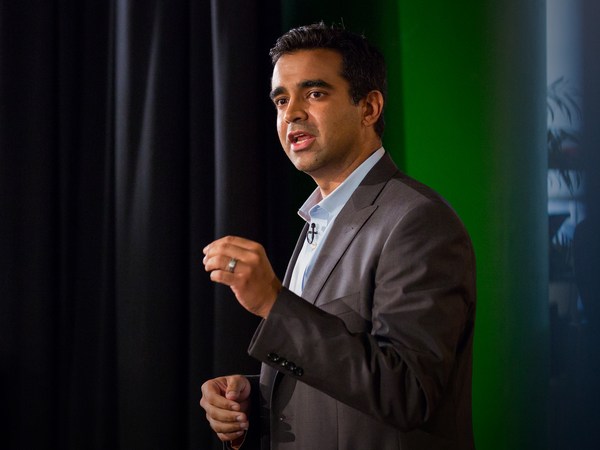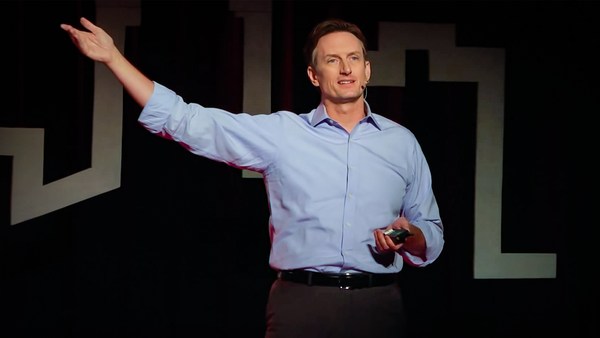Today, we are a country divided, or at least that's what we're told. We are torn apart by immigration, education, guns and health care. Health care is ugly and it is loud, so loud that it threatens to drown out everything else.
(Voice-over) Protesters: Health care is a human right! Fight, fight, fight!
Protesters: Hey hey! Ho ho! Obamacare has got to go!
Rebecca Onie: But what if underneath all the noise, we're not divided? What if the things that we don't ask about are the things that we most agree upon? It turns out that when we ask the right questions, the answers are startling, because we agree, not on health care, but on something more important: we agree on health.
For 20 years, I've been obsessed with one question: What do we, what do all of us need in order to be healthy? As a college student in 1995, I spent months talking to physicians at a chaotic hospital in Boston, asking them, "What's the one thing your patients most need to be healthy?" They shared the same story again and again, one that I've heard hundreds of variations of since. They say, "Every day I see a patient with an asthma exacerbation, and I prescribe a controller medication. But I know she is living in a mold-infested apartment. Or I see a kid with an ear infection, and I prescribe antibiotics, but I know there is no food at home. And I don't ask about those issues, because there's nothing I can do."
Now, it seemed that it shouldn't be so complicated to design a doctor's visit around what people actually need to be healthy. So I created Health Leads, an organization enabling thousands of physicians and other caregivers to ask their patients, "What do you need to be healthy?" and then prescribe those things -- fruits and vegetables, heat in the winter, electricity to refrigerate their medication -- and we then navigated patients to those resources in their communities.
The model works. A Mass General Hospital study found that navigating patients to essential resources is associated with improvements in blood pressure and cholesterol levels similar to introducing a new drug, but without all the side effects.
So two decades later, what's changed? It's now widely recognized that just 20 percent of health outcomes are tied to medical care, whereas up to 70 percent are tied to healthy behaviors and what's called the social determinants of health -- basically, everything that happens to us for that vast majority of time when we're not in the doctor's office or the hospital. Health care executives now routinely remind us that our zip code matters more than our genetic code. And one health care publication even recently had the audacity to describe the social determinants of health as "the feel-good buzzword of the year."
Now, there's been some action, too. Over the past decade, six major health care providers and insurers have committed over 600 million dollars to affordable housing, recognizing that it reduces infant mortality and increases life expectancy. But let's be honest. Is our 3.5 trillion dollar health care system fundamentally designed to create health? Absolutely not.
Take access to healthy food. Not long ago, a teenage boy shows up at a hospital in Baltimore, losing weight. Just as his doctors are huddled up figuring out which metabolic panels and blood tests to run, one of my colleagues asks out loud, "Do you think he might be hungry?" It turned out that this kid had been kicked out of his housing and literally hadn't had a meal in weeks. He said he was "... so relieved that somebody finally asked me."
Somehow, we've created a health care system where asking a patient "Are you hungry?" is so far outside the bounds of what counts as health care that we mostly fail or forget to ask altogether; where doctors lament a hospital's "no third sandwich policy," meaning that if you're a hungry patient in the ER, you can have only two free sandwiches, but as many MRIs as the doctor orders; where, in 2016 in the state of Texas, they spent 1.2 billion dollars on the medical costs of malnutrition instead of on access to healthy food; where a Centers for Medicare and Medicaid Services program stratifies hungry patients, so that some get access to food and some get information about food, with the justification that doing nothing for hungry patients is standard and usual care in this country. And that's just food. The same is true for housing, electricity ... The bottom line is, health care may be changing, but not by enough and certainly not fast enough. We ask the wrong questions of our doctors, of our patients, but also of our citizens. We ask about and argue about health care, but how do voters think about health?
No one could tell us the answer to that question, so we launched a new initiative and hired a polling firm to ask voters across the country: What do you need to be healthy? What was so striking about this was that no one has any clue what we are talking about in health care. Voters do not think the social determinants of health is a feel-good phrase. They actually hate it. "What uneducated person came up with that language?" one of the voters said. Or my favorite was the guy who said, "You're killing me." But when you strip away all the ridiculousness of our language in health care, we know exactly what creates health.
So take Charlotte, North Carolina. We had two focus groups, one of African American Democratic women and one of white Republican women. And we asked them, "If you had a hundred dollars, how would you spend it to buy health in your community? Turns out, they agree nearly to the last percentage point. First, they agree that health care only sort of impacts health. So they choose to spend the majority of their dollars outside of hospitals and clinics. And second, they agree on what creates health, spending 19 percent on affordable housing and about 25 percent on access to healthy food.
So I am sure you are thinking, "This has got to be a fluke." But it's not. White and Latino male swing voters in Seattle, white and African American Democratic voters in Cleveland, white male Republicans in Dallas, low-income white Democrats in Hendersonville, North Carolina: their answers are strikingly similar, with all of them choosing to spend more money on healthy food and safe housing than they would on hospitals and health centers.
When you ask the right questions, it becomes pretty clear: we may be fractured on health care in this country, but we are unified on health.
The thing that I've been struggling with is why. Why do we agree on health? We agree on health because it is common sense. We all know that the things we need to get healthy -- medicine and medical care -- are not the things we need to be healthy, to not get sick in the first place. But we also agree because of common experience. In a study of 5,000 patients, 24 percent of the patients with commercial health insurance -- meaning, they had a job -- still ran out of food or struggled to find housing or transportation or other essential resources. Twenty-four percent. And we saw the same thing in our focus groups. Nearly every voter knew what it meant to struggle, either themselves or their families or their neighbors.
One of those white Republican women in Charlotte was a waitress struggling to stay awake with an enormous Big Gulp soda. She just looked exhausted. And she was. She told us that she worked two jobs but still could not afford a membership to the Y, but it was OK that she couldn't go to the gym, she said, because she also could not afford gas and walked 10 miles to and from work every single day.
Listening to her, I felt this familiar panic rise in me, the residue of my own childhood. When I was 10 years old, my father lay on the living room floor in the grips of one of his many depressions. As I crouched next to him, he told me that he wanted to kill himself. My father lived, but he struggled to work. And my family survived, but we teetered, down one paycheck, relying on my mom's schoolteacher salary. Even as a little kid, I knew we lived in the shadow of financial and emotional collapse. This is really hard to say, because it's taken me 25 years to be honest with myself that this is why I do this work: knowing that my father needed health care to recover, but to be healthy, my family needed something else, we needed a decent income; and knowing, as so many do more than I, that panic when the basics threaten to slip away.
To the voters in our focus groups, the solutions were straightforward. As one of those white Republican women in Charlotte said, "Instead of putting all this money into health care, put it into affordable housing. You know, like, take it and distribute it differently." It turns out that when you have the right language and you ask the right questions, the answers become remarkably clear and unanimous. What we know is that, despite all the noise, the plan for health care in this country is that there is no plan. But we have something more powerful than any politician's bill, any candidate's platform, any think tank's policy statement. We have our common sense and our common experience.
So I ask, if you are a health care executive: Do you know how many of your patients run out of food or struggle to pay the rent at the end of the month? Is that data on your scorecard, shaping your business and your bonuses? If you are a politician: Will you continue to fight on the scorched earth of health care, or will you act on what your voters, what Democratic and Republican voters alike, already know, which is that good wages, healthy food and safe housing are health? And for the rest of us, for the citizens of this country: Will we demand accountability to what we know to be true, which is that our common sense, our common experience, makes us the experts in what it takes to be healthy?
This moment, as it turns out, is not about changing minds. It is about something more powerful. It is about changing the questions we ask and quieting the noise to hear each other's answers. It is about the radical possibility that we the patients, we the physicians, we the caregivers, we the health care executives and yes, even we the people, that we agree. And it is now time -- in fact, long overdue -- for us to marshal the courage to hear those answers and to act upon them.
Thank you.
(Applause)
